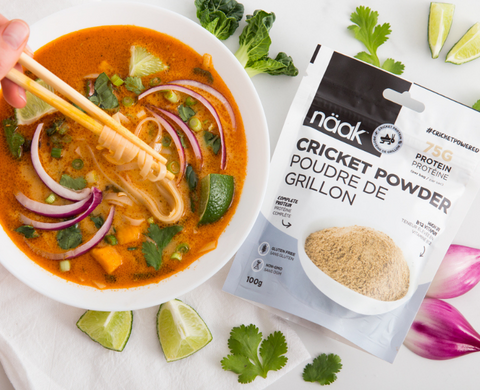Vitamin B12 is one of the 8 B vitamins your body needs daily and one that plays countless roles in your body. No matter if you follow a plant-based lifestyle or not, this vitamin plays a vital role in helping your body break down nutrients to energize you for your day to day activities or tackling your next training session!
THE B VITAMINS
When your body is metabolically breaking down nutrients, your body enzymes are working hard to speed up these reactions. Each enzyme needs a key part so it functions optimally; this part is called a coenzyme. All the B vitamins are important coenzymes that your body needs and so, the breakdown of nutrients depend on these vitamins.
B vitamins are water-soluble vitamins. Because of this, it means you do not store them in large amounts and need to consume some from your diet everyday.
There are up to 8 B vitamins that your body needs. All 8 of these vitamins work together to ensure your metabolism is properly functioning. Both the presence and absence of each B vitamin affects the other’s absence and presence in your body and can ultimately affect your absorption, metabolism and excretion. You can find all the 8 B vitamins, their common names and food sources here:

VITAMIN B12: COBALAMIN & WHERE TO FIND IT
Vitamin B12 is also known as cobalamin.This is because at the center of this large molecule, there is a Cobalt mineral.Like all B vitamins, B12 also plays as a coenzyme. In your body, B12 helps regenerate methionine, an important amino acid, and the synthesis of your DNA. Furthermore on the importance of B12 for your body, your nerves have a protective layer around it, known as a sheath, and B12 helps maintain this sheath and promotes the normal growth of nerves.
Meanwhile, what makes vitamin B12 stand out from other B vitamins is that this vitamin is almost exclusively found in animal-derived foods. So, vitamin B12 is high in meat, fish, seafood, eggs, cheese and milk. If you follow aflexitarian or vegetarian diet, you are likely hitting the target of how much vitamin B12 your body needs. However, if you follow a vegan diet, you may want to find products that are fortified with vitamin B12 or look into cobalamin supplements. For example, soy milk and soy-based meat alternatives are commonly fortified with vitamin B12.
Some foods you may not expect to contain high amounts of vitamin B12 include asparagus, boiled lentils andcrickets!
You are recommended to intake 2.4 micrograms of vitamin B12 everyday.This may seem like a small amount, however, trust that 2.4 micrograms contains billions of B12 molecules and is enough to maintain all the enzymes that require it.
SIGNS & CONSEQUENCES OF VITAMIN B12 DEFICIENCY
Because vitamin B12 must be obtained from the diet, ensuring you are eating a variety of foods is essential to prevent it’s deficiency. This is especially important if you follow a vegan diet as vitamin B12 is found mostly in foods derived from animals. Luckily, our bodies recycle vitamin B12 and so, it may take several years for a vegan to develop deficiency symptoms.
To further highlight the importance of eating a variety of foods, Vitamin B12 and B9, folate, are codependent on each other to function properly in the body. This means you will need to make sure you are also consuming enough folate.

One of the most clear vitamin B12 deficiency is macrocytic anemia, when your body’s red blood cells become too large because they cannot divide properly. You can develop weakness and fatigue easily if you are not producing enough red blood cells your body needs. Other common symptoms of vitamin B12 deficiency include low energy stores, shortness of breath and even a decrease in exercise ability.
Furthermore, vitamin B12 can impair cognition. If deficiency is not detected early and corrected, you could experience reduced neurological function, rapid decline cognitive function and in extremities, permanent nerve damage and paralysis.
VITAMIN B12 FOR ENDURANCE ATHLETES
As mentioned, vitamin B12 plays a large role in producing your red blood cells that transport oxygen to all over your body. This is especially important during endurance events as you can easily become fatigued when your body, especially muscles, does not have enough oxygen. Thus, your vitamin B12 intake can ultimately impact your muscle endurance.

During endurance training, your bloodstream is primarily focused on providing oxygen to your muscles instead of your digestive system. Because of this, many athletes try to consume snacks or liquid fuel that is easily digested and absorbed by the body. Interestingly,a deficiency in B12 can affect absorption levels in the gut, which means although you are consuming nutrients, your body is not utilizing it to provide you energy.
Rest is also a vital part of any athlete’s training program. Sleep is often overlooked in the rest routine; it is just as important as taking the day off from training. Vitamin B12 is important in the production of melatonin, a hormone that promotes sleep, helps stabilize mood and motivation. Like many things in the body, all nutrients, hormones, enzymes are interconnected. When your body is deficient in B12, it can result in an imbalance in melatonin which can directly affect your recovery.
THE VITAMIN B12 SUPERFOOD: CRICKET!
If you prefer to decrease your intake of meat or poultry but still want to fulfill your daily B12 vitamin needs, you can opt for somecricket powder instead! Crickets contain 12x more vitamin B12 than beef, 20x more than eggs, 50x more than pork and 100x more than chicken.
An easy way to fit your recommended daily intake of 2.4 micrograms, you only need to consume 10 grams of cricket powder! In other references, adding 1 tbsp of cricket powder to any dish gives you 190% of your daily vitamin B12 requirement.

Not sure how to incorporate cricket powder into your diet? Don’t worry, you can find out how to do sohere. In case you need a bit of recipe inspiration, you can check some outhere as well!
Want to learn more about the health benefits of crickets? Readthis article about the prebiotic fiber, chitin, and it’s health benefits!































Leave a comment (all fields required)